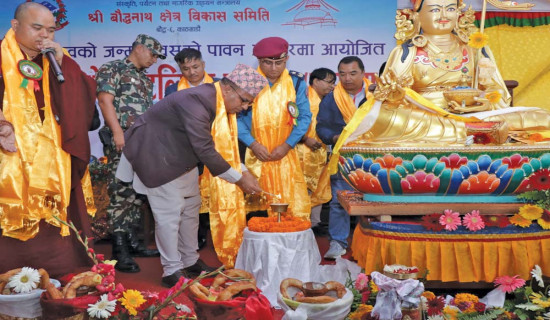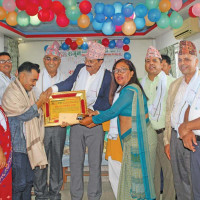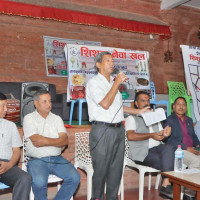- Tuesday, 5 August 2025
Green Jobs Combat Pollution
“The world is laughing at us. You are reducing the lifespan of people. Why are people being forced to live in gas chambers? Better to get explosives and kill them all in one go," a Supreme Court bench led by Justice Arun Mishra told the Centre’s second-senior law officer, Tushar Mehta. The condition of Kathmandu has become worse than that of Delhi, making it the number one polluted city in the whole world. In Kathmandu, air pollution is a serious concern, with the current concentration of PM2.5 at a dangerous level of 132 µg/m2. This concentration is 5.28 times the recommended limit of 15 µg/m2 set by the World Health Organisation (WHO) for a 24-hour mean. Dr. Yadav Prasad Joshi, an environmental epidemiologist, mentions in one of his studies that the smaller the size, the bigger the health risk. PM2.5 stays in the air much longer than PM10, taking days to weeks to be blown away.
According to the Ministry of Health and Pollution, air pollution leads to 42,100 deaths every year, of which 19 per cent are under five children and about 27 per cent are adults over 70 years of age in Nepal. Unfortunately, the most vulnerable among us are the ones who suffer the most. Older people, children, and those with pre-existing health conditions are particularly at risk of experiencing the negative health impacts of air pollution. Moreover, those who live in deprived communities often have limited access to quality healthcare, making them even more vulnerable. The elite have air-conditioned and air-purifying rooms and cars, but the vulnerable and marginalised have none.
Pollution can be a significant reason for migration, especially in developing countries like Nepal, where environmental regulations are weaker or not enforced. Exposure to pollution can have a severe adverse impact on health, leading to respiratory and cardiovascular problems. In some cases, people may prefer to move to other areas or countries with better air quality and a more favourable environment. Pollution can also have economic implications, such as reduced agricultural yields, damage to fish stocks, and infrastructure. These impacts can result in job losses and decreased income, ultimately forcing people to migrate to seek better economic opportunities.
According to the article “Brain drain: The impact of air pollution on firm performance," “firms located in more polluted areas are less capable of recruiting and retaining high-quality individuals, leading to a loss of corporate human capital. We call this view the brain drain hypothesis.” By examining the correlation between air pollution levels and firm performance, the study underscores the detrimental effects of pollution on human capital dynamics within corporations and highlights the intricate interplay between environmental factors and economic outcomes, emphasising the urgent need for proactive measures to mitigate air pollution's adverse impacts on both human capital and corporate performance.
In the first seven months of the current fiscal year 2022/2023, nearly 500,000 youths have gone abroad for foreign employment. According to the data from the Department of Foreign Employment, the number of new labour permits and renewals of labour permits for foreign employment from mid-July to mid-February reached 482,475. This fiscal year, the number of Nepali people who took new final work permits (institutional and individual) within seven months has reached 314,767. In the Nepali month of Magh alone, 39,124 young people obtained work permits for foreign employment. During this period, 167,708 people flew abroad for foreign employment with re-employment permits, according to the data from the Foreign Employment Department.
In 2020/21, agriculture sectors, including fisheries and livestock, accounted for approximately 25 per cent of the national GDP, a decrease from around 32 per cent in 2011/12. Although the contribution of agriculture sectors to the national GDP is decreasing, their role in national production and poverty alleviation remains crucial. According to the Nepal Labour Force Survey conducted in 2008, the proportion of individuals engaged in the agriculture sector was reported to be 73.9 per cent of the population. However, the corresponding proportion has decreased significantly to 60.4 per cent in 2017.
In every other house, family members are either settled abroad or working as laborers. The situation in villages is so dire that there are no young people left to even carry the dead for cremation. This leaves Nepal with the largest population of children acquiring primary-level education, homemaking women, and senior citizens. This is leading to a reduction in agriculture and afforestation, which, as a result, is responsible for the increase in pollution.
Once vibrant and lush, the lands we once called home now stand barren, stripped of their verdant glory. The absence of youthful vigour echoes through the silent valleys and across the desolate fields. Our towns, once bustling with life, now mourn the exodus of our brightest minds, all seeking solace on foreign shores. As we gaze upon the withered landscapes, memories of laughter and shared dreams haunt our thoughts, reminders of a time when hope flourished like the fields of green. Yet, amidst the desolation, a flicker of determination ignites within us. It is not too late to reclaim what was lost and breathe life back into our forsaken lands.
Amidst the destruction of our once-thriving landscapes, there is a glimmer of hope. Rather than giving up, we must take action. The solution lies in pursuing green jobs, which will help us preserve the environment and promote sustainable development. By taking on these roles, we can not only bring life back to our barren lands but also rejuvenate our communities and their prosperity.
A green job is not just any occupation; it plays a pivotal role in safeguarding our planet while fostering sustainable growth. These jobs span crucial sectors like renewable energy, energy efficiency, sustainable agriculture, biodiversity conservation, and waste management. By dedicating ourselves to these endeavours, we not only contribute to environmental preservation but also pave the way for personal and collective prosperity. It's time to make the choice that not only benefits us but also ensures a thriving future for generations to come. Embrace green jobs and shape a world where sustainability reigns supreme.
Nepal, a country renowned for its stunning landscapes and commitment to environmental preservation, has vast potential for creating green jobs. Hydroelectric engineers can utilise Nepal's abundant water resources to develop hydroelectric projects that provide clean energy to both rural and urban areas. Solar energy technicians can harness Nepal's ample sunlight to install and maintain solar panels, extending electricity access to remote communities and reducing dependence on fossil fuels.
Sustainable tourism guides can lead eco-conscious tours, showcasing Nepal's natural wonders while promoting responsible travel practices and supporting local conservation efforts. Moreover, organic farming specialists can assist farmers in transitioning to sustainable agricultural practices, meeting the growing demand for organic products, and promoting food security.
Meanwhile, waste management entrepreneurs could address urban pollution by establishing recycling initiatives and waste-to-energy programmes, mitigating environmental degradation, and creating employment opportunities. Architects specialising in green building can use eco-friendly construction techniques to design energy-efficient structures that blend seamlessly with Nepal's natural surroundings. By embracing these and other green job opportunities, Nepal can leverage its rich environmental heritage to promote economic growth, social equity, and a sustainable future for generations to come.
Summing up, the intertwined challenges of air pollution, brain drain, and sustainable economic development demand innovative solutions that prioritise environmental stewardship and human capital retention. By investing in renewable energy, sustainable infrastructure, and environmental conservation initiatives, societies can not only mitigate pollution but also generate meaningful employment opportunities that retain talent, foster economic growth, and safeguard the well-being of communities.
(The author is studying BA.LLB. 5th year at Kathmandu School of Law.)

















